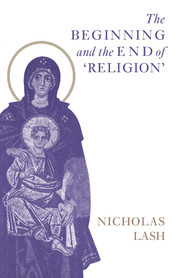Book contents
- Frontmatter
- Contents
- Preface
- PART ONE A MEETING-PLACE FOR TRUTH
- PART TWO EMERGING FROM MODERNITY
- 4 Observation, revelation and the posterity of Noah
- 5 On what kinds of things there are
- 6 Contemplation, metaphor and real knowledge
- 7 When did the theologians lose interest in theology?
- 8 Anselm seeking
- 9 Creation, courtesy and contemplation
- 10 Hollow centres and holy places
- 11 Hoping against hope, or Abraham's dilemma
- 12 Eagles and sheep: Christianity and the public order beyond modernity
- 13 Incarnation and determinate freedom
- 14 Beyond the end of history?
- List of works cited
- Index
6 - Contemplation, metaphor and real knowledge
Published online by Cambridge University Press: 05 March 2012
- Frontmatter
- Contents
- Preface
- PART ONE A MEETING-PLACE FOR TRUTH
- PART TWO EMERGING FROM MODERNITY
- 4 Observation, revelation and the posterity of Noah
- 5 On what kinds of things there are
- 6 Contemplation, metaphor and real knowledge
- 7 When did the theologians lose interest in theology?
- 8 Anselm seeking
- 9 Creation, courtesy and contemplation
- 10 Hollow centres and holy places
- 11 Hoping against hope, or Abraham's dilemma
- 12 Eagles and sheep: Christianity and the public order beyond modernity
- 13 Incarnation and determinate freedom
- 14 Beyond the end of history?
- List of works cited
- Index
Summary
DOING EPISTEMOLOGY WHEN THINGS GO WRONG
We have been asked to ‘focus’ our deliberations on questions of epistemology. I shall begin by suggesting reasons why this request, although by no means unexpected, should nevertheless be treated with suspicion, hence my heading for this first section: ‘Doing epistemology when things go wrong’.
Next, I shall consider how things came to be the way they are, where relations between science, and philosophy, and theology are concerned. And I shall suggest that human beings might be a more fruitful topic of conversation between theology and the natural sciences than the initial conditions of the universe.
Thirdly, under the heading of ‘The recovery of metaphor’, I shall indicate some implications of the fact that a brief episode in the history of Western culture seems to be now drawing to a close: an episode during which great store was set on ‘univocity’ as paradigm strategy for straightforward speech, while metaphor was the suspect homeland of poetic licence. And as we discover, once again, that we must live and tell our stories in unlabelled places, we need to relearn ancient lessons about how we may speak of God, of God's knowledge and of our knowing God.
Finally, I shall say something about that courtesy or reticence, the ‘silencing of easy speech’, which is the hallmark of responsible utterance not only in Christian worship and theological reflection, but across the whole range of academic or ‘scientific’ practices.
- Type
- Chapter
- Information
- The Beginning and the End of 'Religion' , pp. 112 - 131Publisher: Cambridge University PressPrint publication year: 1996
- 2
- Cited by



